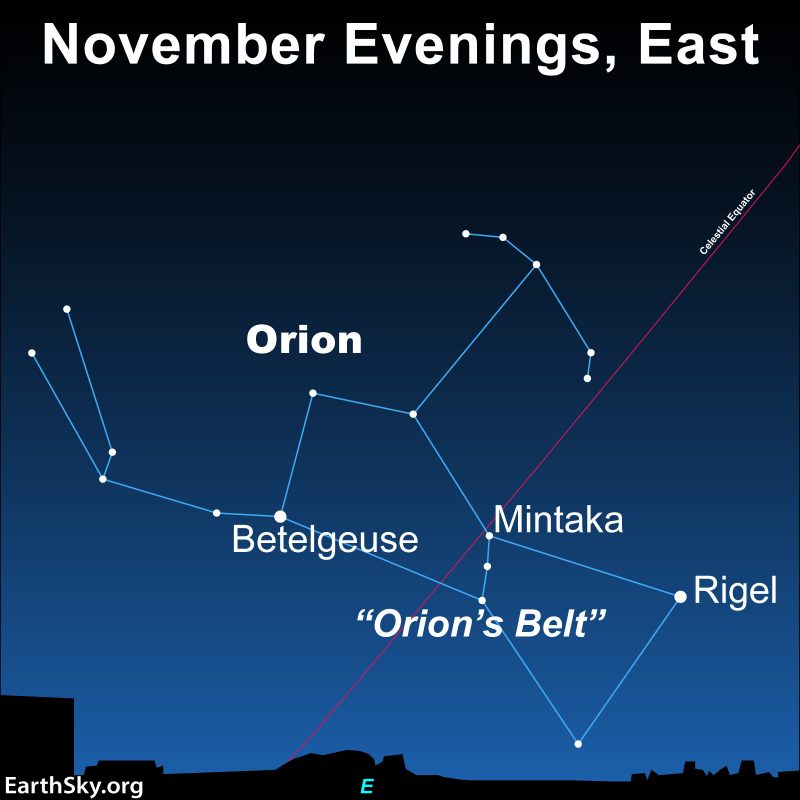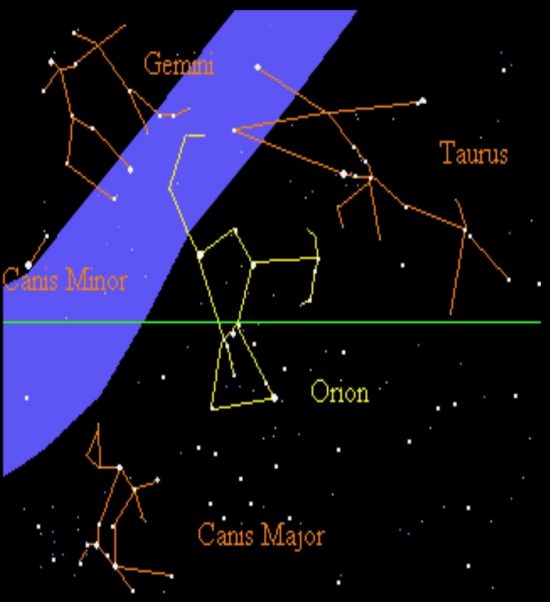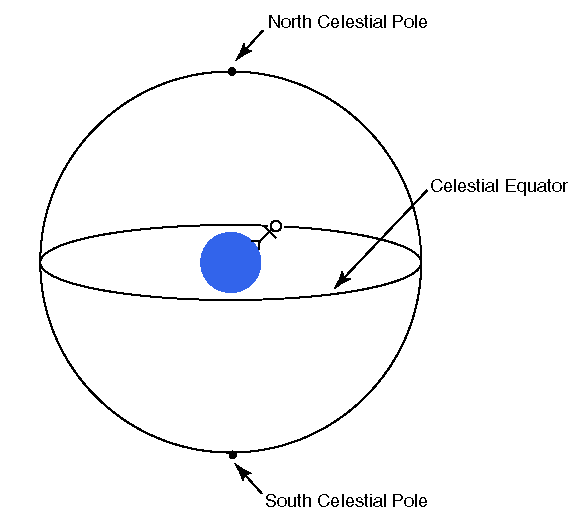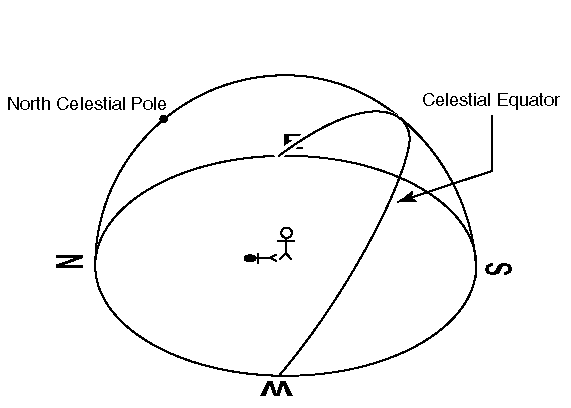
Look for Mintaka in Orion’s Belt
See the three stars at Orion the Hunter’s midsection? These stars are Alnitak, Alnilam, and Mintaka. They’re very noticeable and famous in many cultures as Orion’s Belt. To the Aymara people of Bolivia, Peru and Chile, they represent a celestial bridge. And there’s good reason for that. These stars link the sky’s northern and southern hemispheres.
Consider Mintaka, which is the Belt’s westernmost star. It sits almost directly astride the celestial equator: the projection of Earth’s equator onto the stellar sphere.
Where can you find Mintaka and the constellation Orion? In late November, from around the world, Orion rises into your eastern sky around 9 p.m. and climbs highest for the night around 1 to 2 a.m. local time. That’s the time on your clock no matter where you are on the globe.
When dawn is breaking, or about to break, say around 5 to 6 a.m., the Hunter sits low in your western sky.

Mintaka shines on the celestial equator
Mintaka’s location on the celestial equator makes it a good guidepost for finding directions here on Earth. That is, Mintaka and the other stars of the Celestial Bridge are visible worldwide. From all over the world, Mintaka rises due east, sets due west, and remains in the sky for 12 hours. It climbs to its highest point in the sky midway between rising and setting.
When it’s highest in the sky, if this star shines at your zenith (your straight-overhead point), then you must be at the equator.
If this star shines in the southern half of your sky, then you must be north of the equator.
If this star shines in the northern half of your sky, then you must be south of the equator. From most of South America, for example, Mintaka appears in the northern sky.
The story of the Celestial Bridge is one of many about the constellation Orion. That’s because it’s so noticeable on our sky’s dome. Watch for it when you’re outside one evening soon!


Bottom line: The indigenous Aymara people of the Andes and Altiplano regions of South America see the famous sky feature we know as Orion’s Belt as a celestial bridge between the sky’s Northern and Southern hemispheres. Its westernmost star, Mintaka, lies directly on the celestial equator.
The post See Orion’s Belt as a celestial bridge first appeared on EarthSky.
from EarthSky https://ift.tt/3r0Plcq

Look for Mintaka in Orion’s Belt
See the three stars at Orion the Hunter’s midsection? These stars are Alnitak, Alnilam, and Mintaka. They’re very noticeable and famous in many cultures as Orion’s Belt. To the Aymara people of Bolivia, Peru and Chile, they represent a celestial bridge. And there’s good reason for that. These stars link the sky’s northern and southern hemispheres.
Consider Mintaka, which is the Belt’s westernmost star. It sits almost directly astride the celestial equator: the projection of Earth’s equator onto the stellar sphere.
Where can you find Mintaka and the constellation Orion? In late November, from around the world, Orion rises into your eastern sky around 9 p.m. and climbs highest for the night around 1 to 2 a.m. local time. That’s the time on your clock no matter where you are on the globe.
When dawn is breaking, or about to break, say around 5 to 6 a.m., the Hunter sits low in your western sky.

Mintaka shines on the celestial equator
Mintaka’s location on the celestial equator makes it a good guidepost for finding directions here on Earth. That is, Mintaka and the other stars of the Celestial Bridge are visible worldwide. From all over the world, Mintaka rises due east, sets due west, and remains in the sky for 12 hours. It climbs to its highest point in the sky midway between rising and setting.
When it’s highest in the sky, if this star shines at your zenith (your straight-overhead point), then you must be at the equator.
If this star shines in the southern half of your sky, then you must be north of the equator.
If this star shines in the northern half of your sky, then you must be south of the equator. From most of South America, for example, Mintaka appears in the northern sky.
The story of the Celestial Bridge is one of many about the constellation Orion. That’s because it’s so noticeable on our sky’s dome. Watch for it when you’re outside one evening soon!


Bottom line: The indigenous Aymara people of the Andes and Altiplano regions of South America see the famous sky feature we know as Orion’s Belt as a celestial bridge between the sky’s Northern and Southern hemispheres. Its westernmost star, Mintaka, lies directly on the celestial equator.
The post See Orion’s Belt as a celestial bridge first appeared on EarthSky.
from EarthSky https://ift.tt/3r0Plcq

Aucun commentaire:
Enregistrer un commentaire